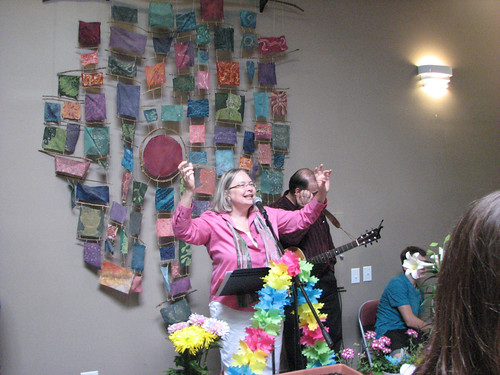Tradition can be a fine, fine thing. We can learn from traditions, benefit from traditions, pass on traditions and these can all be good things.
But tradition itself does not guarantee a practice is a good thing. There are good traditions and bad traditions and those in between.
I say all of this because I was recently reading a person on the internet who was wrong. (ha!)
This person (and there are many like this person - again, it's the idea that I'm speaking of, not the person) was bemoaning the fact that churches don't tend to keep children in their church services. Instead, they coddle them by taking them out for their own "special service," and thus deprive them, they contended, of the benefits of learning to sit through and endure a church service that means very little to you.
The reason, of course, this person wanted to see kids sit through church services was because the Bible is so clear on the point. "Thou shalt keep the little ones in the synagogue, yea even though the little ones are bored out of their skull..."
No, wait, that's not right. In fact, there is no biblical demand to keep children in a service or, in general, to treat them as adults to make them learn by sheer repitition the value of sitting through something that makes no sense to them.
No, the reason that this person wanted children to sit through services was because of all the pedagogical studies that show the benefit of forcing children to sit still and listen to stuff that makes no sense to them in the learning process.
Wait, that's not right, either. There ARE no such studies.
In fact, as far as I can tell, there was one reason and one reason alone that this person wanted children to remain in their church service: It was the way they were brought up and if it was good enough for kids back then, it's good enough for kids today.
Tradition.
This person said...
I come from an older generation. When we were kids, we went to church with our parents. We sat quietly and listened or doodled or something, but we sat there.
Me, too. I'm from that generation, as well. I remember that tradition.
But what is the logical or biblical or pedagogical reason for this? None, so far as I can determine.
I mean, the reasoning is, "IF they learn to sit through this and be still now, while they're kids, then they'll be able to sit through boring sermons in the future, too."
And there IS some value, I think, to learning patience and to endure through things, even things that are extremely boring and irrelevant to you. But is forcing kids to sit quietly through a service a good way to do this?
I don't think so.
This person reasoned...
I don't believe it's because the kids won't understand the preaching. I think it's because the kids will disrupt the preaching. I don't think it's because the children aren't mature enough to understand. Nor do I think it is less than valuable for them to remain. It's my conviction that the primary reason children are dismissed from church services at the edge of the sermon is that they lack the discipline not to be a distraction to the people around them. It's not a maturity problem or even that kids are better taught at their own age level. It's a parenting problem.
Of course.
This person goes on to concede...
You know, under the age of 1 with nursing and all, I can imagine the need for a nursery. I was thinking more of the age where kids are being taught, not simply present.
So, at 18 months, apparently, this person thinks that children can be effectively taught something in church services and they lament that parents no longer see the value in raising children as this person was raised.
The thing is, EVEN THOUGH, learning to sit and learn can be a good thing, we don't ask five year olds to sit through a physics class, insisting they be relatively still so the adults around can learn what is being taught. We don't ask two year olds attend and sit quietly through a medieval history class. There is the concept of age-appropriate material and teaching styles that are suited for children of particular ages.
When we force most kids to sit through class after class (in a church service or a school or wherever) and endure something that is being taught in a manner that is over their heads, time after time, most kids DO learn something: They learn, "BOY! That's boring! I don't want NOTHING to do with that!"
How much better to take children out of a church service (or other adult-themed class) and teach them something they CAN learn in a teaching style suited to children, not to adults? My concern would be that we're teaching kids the wrong things when we teach them in the wrong way.
There is something to the concept of age-appropriate teaching and just because it isn't in your tradition to have age-appropriate teaching does not mean that your tradition is right.
I think a good question to ask is, "Is there any logical, biblical, study-based, common sense reason to believe this tradition is a good one?" and if the answer is No, then perhaps it's time to let that tradition go, or at least quit suggesting that people are wrong for following a tradition simply for tradition's sake.
Tuesday, May 24, 2011
Thoughts on Tradition and Learning Styles
Sunday, May 22, 2011
Earth Day 2011
Thursday, May 19, 2011
Bike to Work...
...to school, to church, to play, to shop...
Tomorrow, we in Louisville celebrate Bike To Work Day and it is a good day to recall that, as Grant Peterson noted, the bicycle is "rideable art that can just about save the world."
An astounding claim, but not a hyperbolic one, I'd suggest.
It's also a good time to recall how important bicycles were at least for a small part of our history. Here, I'll quote from a fine essay from the American Studies website at the University of Virginia...
Amongst the bicycles most important, and perhaps most enduring, legacies is its effect upon women's issues; indeed the mark the bicycle left upon gender relations in the 1890s is difficult to underestimate. One must remember that the America of years past was one of rigidly defined gender roles, with distinctly separate spheres of activity for men and women. The distinctions between the sexes were certainly as rigidly defined as ever in the years leading up to the 1890s--the years we popularly refer to as the Victorian era.
However, as the 19th century came to a close, women were gradually making headway into the male-dominated public sphere, through increased roles in education, social and political organizations. Perhaps as a response to the seemingly increasing potential for equality amongst the sexes, men begin to more and more delineate themselves in terms of physical prowess. Cycling, then took its natural place amongst football, baseball, and other male dominated spheres of activity. One can imagine the indignation, often expressed in terms of health or morality, that many a male felt when the woman was shown to be just as adept at handling the cycle as her counterpart.
Simply put, the bicycle allowed for movement into new spaces, literally and figuratively. The woman of the 19th century who had been given little opportunity to cultivate or express her autonomy now had a vessel with which one could not only develop autonomous power, but do so while leaving behind the old reliance upon men for travel. It's easy to see then, why Susan B. Anthony, women's rights advocate and future star of an ill-fated dollar, was to say that the bicycle had "done more to emancipate women then anything else in the world"...
Rational dress aside, the bicycle, despite being heaped with scorn by outraged men, was consistently trumpeted by progressive women as a tool for increased freedoms. Indeed, many feminist tracts of the day frequently invoked the bicycle as a metaphor for increased self-control... the author of Bicycling for Ladies, Maria Ward, bluntly notes that "Riding the wheel, our powers are revealed to us...".
Ride or DieIt is precisely this sort of attitude, empowerment coupled with visions of an increasingly egalitarian future, that angered many men greatly. Simply put, the woman on wheels was a threat to the well ingrained system of practical inferiority that men had been taking advantage of for centuries, and outraged men were quick to point to the bicycle as a threat to the social order. The cycle, it was argued, would disrupt the delicate sphere of the family unit by allowing the woman to travel beyond her previous limits without the surveillance of a knowing husband nearby. The younger woman, too was vulnerable to a bicycle induced lapse in morals, for it allowed her to stray farther a field with members of the opposite sex during courtship.
The leveling effect acheived by the woman on the bicyle was so great that the coming of the automobile and subsequent demise of the bicyle can be though of as a major step backwards for women's empowerment.
So, take an historic stand. Ride a bike. Save the world.
Monday, May 9, 2011
Grace in the Benefit of the Doubt
I am posting the bulk of my pastor's sermon from yesterday. I usually post these church-y types of things on our church blog, but it is so fitting in light of recent conversations around here that I wanted to post it here.
Our services tend to have two types of sermons/services:
1. Those that are powerful, gripping and dripping with God's grace and challenging us to walk by grace in the steps of Jesus, and
2. Those that are even MORE powerful, gripping and dripping with God's grace.
This is one of the latter sort... at least it was for me.
======
On the evening of that first day of the week, when the disciples were together, with the doors locked for fear of the Jewish leaders, Jesus came and stood among them and said, “Peace be with you!” After he said this, he showed them his hands and side. The disciples were overjoyed when they saw the Lord.
Again Jesus said, “Peace be with you! As the Father has sent me, I am sending you.” And with that he breathed on them and said, “Receive the Holy Spirit. If you forgive anyone’s sins, their sins are forgiven; if you do not forgive them, they are not forgiven.”
~John 20
It’s interesting to me that out of all the things that the Risen Christ might have said, maybe did say to his cowering in fear disciples, that out of all the blessings, out of all the charges that he could have given, that the one that the author of John reports is about forgiving and retaining sins.
If you forgive the sins of any, they are forgiven; if you retain the sins of any, they are retained.
I’ve always wondered what he meant by that. And I’ve shied away from ever really preaching about it because on the surface it kind of sounds like the Risen Christ was giving the church the power to forgive or to not forgive sin, to decide who is in and who is out, who is clean and who is unclean, etc. And I, for one, have not been very happy with the church’s record in that regard.
I grew up believing that God didn’t forgive you until you said a special little “please forgive me of all my sins, Jesus” prayer, which meant that the large majority of the non-Southern Baptist world, having not said that particular prayer, was left unforgiven. I’m exaggerating about that a little bit, but not much.
But what I’ve realized along the way is that this statement isn’t about the church’s power to forgive sin or to not forgive sin. It’s about Christ’s power to forgive sin, and about the church’s power through Christ to proclaim the forgiving love of God, and to live as forgiving and forgiven people.
Martin Niemoeller talks about Easter as the “unexpected act of the living God, which interrupts and runs counter to the uniform rise and fall of the world’s rhythm.” Talk about running counter to the uniform rise and fall of the world’s rhythm — some of us experienced that this week, didn’t we, when our world was cheering over the death of Bin Ladan, and we were saddened, or if not saddened, concerned, or if not concerned, at least ambivalent over the violent death of, yes, we can say it, one of God’s children.
I attended part of a conference at Louisville Presbyterian Seminary on Monday morning, and there was a part of the worship service where people were voicing prayers aloud, and as I was struggling to find words to express a prayer about our response to the death of Bin Laden, someone else simply prayed, “God, give us the courage to forgive our enemies.” It was perfect, and I was grateful to be in a setting where people were seeking to love, seeking to not gloat, to not rejoice in the demise of another, however dastardly that other was. I was grateful to be in a community where the uniform rise and fall of the world’s rhythm was interrupted by a great jolt of forgiveness.
Of course, it’s easier to gloat, to not forgive. But thankfully, Craig Barnes reminds us that “we are not on our own for this. Jesus gave us the Holy Spirit before he called us to forgive. The work of the Spirit is to bind us into the work of Jesus Christ. What this means is that we disciples are not called to produce forgiveness. We’re called to be the priest pronouncing that which has been produced on the cross...”
Jesus’ charge to the disciples was to carry on the work that he had started. I am thinking of the woman caught in adultery. The crowd was ready to stone her, but Jesus said, “Let the one among you who has never sinned cast the first stone.” I am thinking of the story of when Martha came out of the kitchen madder than a wet hen because Mary hadn’t been lifting a finger to help cook, and Jesus defended Mary. “Mary has chosen that right thing,” he said. And later, when Judas jumped all over Mary for wasting an expensive bottle of perfume to annoint Jesus, and once again Jesus defended her.
It seems to me that one of the things that Jesus did consistently through the Gospel of John was to give people the benefit of the doubt, to take what others saw as “sin,” as “shortcoming,” as “uncleanliness,” and to reinterpret it.
In the story of the woman caught in adultery, he didn’t downplay the seriousness of the woman’s sin, but he did put it into context for everyone there: “Let the one who is without sin cast the first stone.” Yeah, okay, she sinned, but really who hasn’t? And in the stories of Mary, with Martha, and with Judas, he reinterpreted Mary’s actions, which were seen as negative by others in both cases, Mary should have been working in the kitchen, fulfilling her role as a woman, right, and Mary shouldn’t have wasted so much money on one lavish act of love, right, he reinterpreted her actions, and pronounced them good, pronounced her good. “Wherever the gospel is preached, she will be remembered.”
And it strikes me that while the forgiveness that we usually talk about is, I will forgive you for what you have specifically done to me, that it’s broader than that. It’s an approach to the world, it’s a lavishness, a liberality, an automatic giving of the benefit of the doubt. It’s a willingness and not just a willingness, but a habit of going deeper, of looking beyond and beneath, of seeing people, not just in light of what they’ve done, of how they’ve screwed up, but through the eyes of someone who truly loves them...
If you forgive the sins of any, they are forgiven; if you retain the sins of any, they are retained.
If we look at people through a stingy, judgmental lens, we are retaining their sins, accentuating their failures, perpetuating their sense of shortcoming. But if we look at people through a lens of grace and tenderness and love, then, poof, it’s no longer their shortcomings that are foremost in our minds, and maybe, just maybe not in their minds, at least for awhile, either.
What is that verse in 1st Peter? “Love covers a multitude of sins.”
Of course, we can proclaim forgiveness, live in a spirit of forgiveness and grace and still not seem to make much a difference in the lives of those around us. But we can be assured that the one place that it will make a difference is in our lives.
In his book about South Africa’s Truth and Reconciliation Process, Bishop Desmond Tutu tells the following story: A recent issue of the journal ‘Spirituality and Health’ had on its front cover a picture of three U.S. ex-servicemen standing in front of the Vietnam Memorial in Washington, D.C. One asks, “Have you forgiven those who held you prisoner of war?” “I will never forgive them,” replies the other. His mate says: “Then it seem they still have you in prison, don’t they?”
Bishop Tutu says that forgiving does not mean forgetting and it does not mean condoning. It does not mean minimizing what happened or not taking it seriously. And I would add that it does not mean going back to an abusive partner or putting yourself in a situation where you will be used or taken advantage of. What it does mean is, says Tutu, is “drawing out the sting in the memory that threatens to poison our entire existence.”
Eugene Peterson, in his paraphrase of scripture, The Message, interprets it like this:
"If you forgive someone's sins, they're gone for good. If you don't forgive sins, what are you going to do with them?"
Craig Barnes, again, says, “If we do not forgive those who hurt us, the only alternative is to retain the sins. To retain means to hold, and to hold onto hurt is to lock ourselves into the identity of victim. In the words of Lewis Smedes, ‘When you forgive you set a prisoner free. And then you discover that the prisoner was you.’"
On Easter, Karen mentioned the movie that some of us had gone to see the day before, “Of Gods and Men,” about nine Catholic priests who chose to remain at their monastery in Algeria even though they knew that their lives were in danger due to a rebel-led insurrection against the government. In one of the most on the edge of your seat scenes, the rebels, who had previously executed a number of foreigners in the same town, force their way into the monastery to demand medical care and supplies.
Brother Christian, the leader of the priests, refuses to send the elderly doctor with them, saying that he is too feeble to make the journey and that they can come to the clinic instead. He also refuses to give them medicine, saying that their supplies are low, and that the villagers need them. The rebel leader says, “You have no choice.” And Brother Christian, knowing that he could be shot to death any minute, replies, “Yes. I do.”
The people of the Risen Christ know that we always have a choice. Not in what happens to us, but in how we respond. We can choose to love, we can choose to walk the second mile, we can choose to turn the other cheek, we can choose to forgive, we can choose to live powerfully as the people of the Risen Christ, defined only by love, controlled only by love.
We have a choice. We are free.
Wednesday, May 4, 2011
Irony
IRONIC FUNDAMENTALIST COMMENT OF THE DAY:
Warning: Be sure to save your comments if you post at [Mr X's] site. He has a history of deleting comments, only to then lie about what the comments really said. Should we be surprised that a false teacher would do such a thing?
This was said by a Religious Right sort of dude who routinely moderates, deletes and bans those who disagree with them and has set up a whole blog dedicated to lying about people's positions, twisting their words and comments and, of course, refusing to allow them to defend themselves!
Is it really possible that this person fails to see the irony?
It truly is amazing how consistently - at least in my tiny little corner of the blogging world - that there is ONE group of bloggers that ban and moderate comments: The Religious Right (or maybe Christian Fundamentalists is the better descriptor?).
There ARE exceptions - Marshall, Doug and Chance (and John, when he belonged sort of to the Religious Right) allow people to make comments and are prepared to get in there and discuss their views and our views without feeling the need to moderate or delete or ban outright. Good for them on this point, if nothing else.
But beyond those few hearty souls, religious right blog after religious right blog, nearly down to the man (and it IS almost always men), either moderate or outright ban and delete comments from those who disagree too much on the wrong topics.
Why is that?
I tend to call it cowardice - that they're afraid to engage with those with disagreeing opinions - that they're afraid to let people defend their own arguments, scared that other people will be won over by the "false teachings" of "heretics" and "pagans." But they DO engage in SOME conversation, even if only for a little bit, with people they disagree with. So, they're not totally averse to having conversations with those who disagree.
But sooner or later (oftentimes sooner), the ban comes down, the moderation goes up.
Or, truly, many, many of these sites have moderation on right from the get-go. They want to be the gatekeeper to approve only those messages that they deem worthy (based on what? one wonders).
So, there IS an element of fear in their moderation/banning, but I don't think that's exactly the right word. Intellectual laziness, perhaps - they don't want to have to spend TOO much time defending their position - that might be part of it, at least for some of them.
But is there a more apt term for that sort of behavior?
And worse, what of those who will spend whole threads demonizing/twisting/slandering/gossiping others they disagree with and then refuse to allow that person to defend themselves?
What IS the best word for such despicable behavior?
Cowardice? Intellectual laziness? Anti-intellectualism? Ungentlemanly or Unseemly (those both seem way too mild)? Indecorous? Untoward? Indecent??
I'd love to see some study into how widespread this phenomena is (after visiting dozens of such sites, personally, I'd say I've seen it in at least 90% of them) of banning/moderation by the religious right (or fundamentalists) and how it compares to those who are not more fundamentalist in nature?
It would also make for any interesting psychological study, I'd think.



